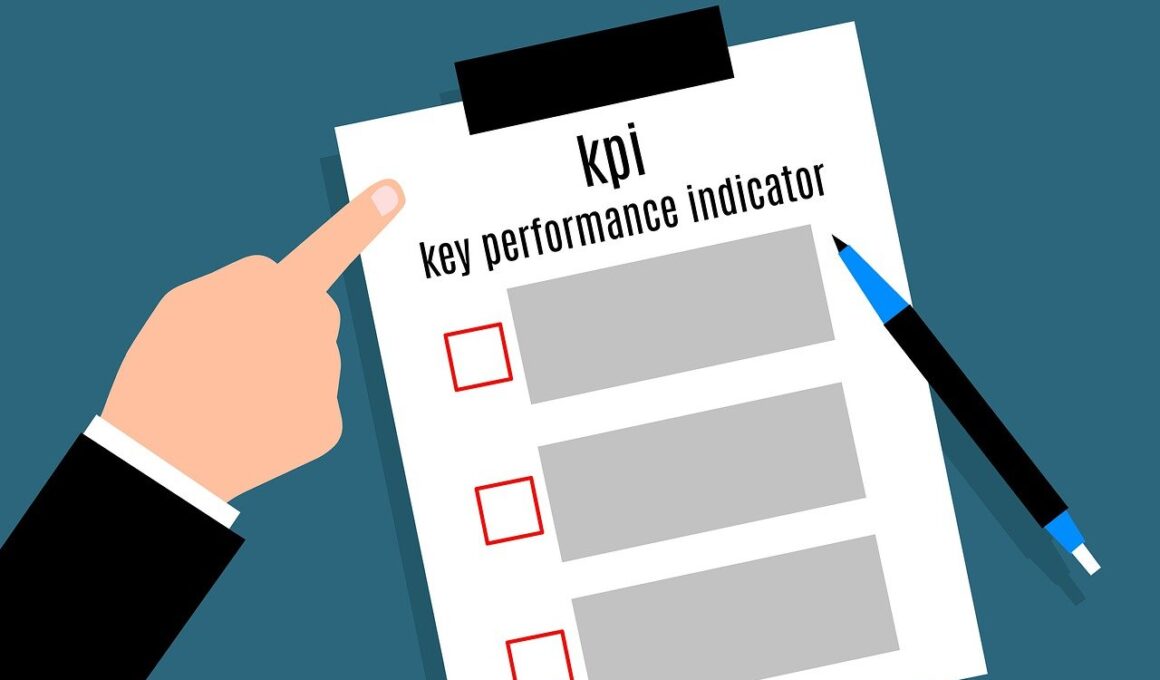Evaluating ROI on Marketing Initiatives with KPIs
Measuring the return on investment (ROI) for marketing initiatives is essential for businesses to ensure that they are allocating resources effectively. Establishing strong KPIs, or key performance indicators, will facilitate this process by enabling marketers to track their progress over time. When developing these KPIs, one must consider both quantitative and qualitative metrics to gain a comprehensive view of performance. Examples of quantitative metrics include sales revenue generated from campaigns, customer acquisition costs, and conversion rates. On the other hand, qualitative metrics can provide insights into customer satisfaction and brand perception. These combined indicators not only help in evaluating marketing efforts but also inform future strategy adjustments. Furthermore, having explicit KPIs places a greater emphasis on accountability among marketing teams. It leads to a culture of data-driven decision-making that supports prioritization of initiatives that demonstrate tangible results. In the increasingly competitive landscape, understanding which marketing channels yield the best ROI allows companies to allocate their budgets more effectively, resulting in strategic growth and sustainability. A well-defined approach will ultimately enhance long-term success for the organization.
The selection of the right KPIs is crucial for evaluating the efficacy of marketing initiatives. Businesses must identify which specific metrics align with their overall strategic goals to develop meaningful measures of success. Leading indicators should focus on tracking real-time performance, allowing marketing teams to adapt strategies promptly. For instance, measuring engagement rates on social media can indicate how well a campaign is resonating with the audience before the sales data is available. Additionally, lagging indicators measure the outcomes after the initiatives have been implemented, such as overall revenue growth or customer lifetime value. By combining both metrics, businesses can create a robust framework to analyze their marketing performance intricately. However, incorporating periodic reviews is equally important to ensure that KPIs remain relevant and continue to align with the continuing evolution of marketing strategies. As markets change, customer behaviors may shift, necessitating a reassessment of the KPIs selected to measure marketing success. Outdated indicators can lead to misguided decisions, hindering growth. Unearthing which KPIs matter the most to your organization allows for deeper insights and more effective campaigns.
Understanding the Value of KPI Development
Effective KPI development is vital for any organization that seeks to measure the success of its marketing efforts quantitatively. Clearly defined KPIs create benchmarks for performance that paint a clear picture of where an organization stands in the market. Not only do these indicators help track marketing initiatives, but they foster a solution-oriented approach to achieving organizational goals. For example, if the key performance indicator for a content marketing strategy is to reach a certain number of website visitors each month, teams can tailor their content to ensure they achieve this goal. Without these metrics, teams may lack focus and direction. KPIs must be updated regularly to reflect changing business objectives, as well as evolving industry trends. One common mistake is to become too focused on vanity metrics, which may not translate into valuable revenue or customer engagement. Businesses should prioritize actionable data that relates directly to their objectives. Developing KPIs should involve cross-disciplinary collaboration, ensuring that all stakeholders have input into the metrics that will be used to appraise performance.
When devising KPIs, it is essential to create specific, measurable, attainable, relevant, and time-bound metrics, often referred to as the SMART criteria. Each component plays a significant role in ensuring that the KPI is effective in measuring marketing initiatives. Specific metrics focus on particular areas of performance, such as increasing social media engagement rates or enhancing email open rates. Measurable refers to quantifying results, while attainable ensures that objectives are realistic yet challenging. Relevant emphasizes the importance of aligning KPIs with broader company goals, ensuring that the metrics matter to the organization. Lastly, time-bound sets deadlines for achieving goals, fostering urgency in execution. By adhering to the SMART criteria, businesses can create KPIs that are meaningful and contribute to valuable insight into the performance of marketing strategies. Implementing KPIs that meet these standards also simplifies data analysis and reporting. This ultimately helps stakeholders understand the effectiveness of their marketing campaigns effectively. Furthermore, this focus on organized, structured objectives promotes increased accountability within teams.
Utilizing KPIs for Continuous Improvement
The adoption of KPIs is just the beginning of a journey toward effective marketing performance management. Once established, businesses must continuously analyze these indicators to drive improvements in their marketing efforts. By regularly reviewing KPI data, teams can pinpoint areas that need refinement while celebrating successful initiatives. Identifying trends in data can also provide valuable insights into customer behavior. Moreover, analyzing when specific KPIs fall short can help businesses diagnose problems early on and make necessary adjustments. For instance, if customer acquisition costs surpass expectations, reevaluating the marketing channels and methods is vital. This continuous feedback loop fosters a culture of improvement, encouraging teams to innovate and adapt to ever-changing market dynamics. Additionally, maintaining regular communication throughout the organization about the performance metrics can help unify stakeholders around shared goals. Establishing open channels for discussing KPI outcomes encourages collaboration and teamwork, which are essential to achieving desired results. The end goal is not merely to track progress but to leverage insights derived from KPIs to continuously enhance marketing effectiveness and drive business growth.
To successfully implement KPIs in evaluating marketing initiatives, organizations must invest in the right tools and technologies. Leveraging analytics platforms and software will help streamline data collection and analysis processes, making it easier for teams to visualize results. Access to real-time reports will enable marketers to react swiftly to market changes, optimizing campaigns when necessary. Furthermore, integrating various data sources allows for a holistic view of performance, enabling comprehensive analysis that includes multiple marketing channels. Businesses might also benefit from training employees on how to interpret KPI data effectively. Understanding these critical indicators promotes informed decision-making, allowing teams to pivot strategies based on analytical insights. Some organizations may choose to run A/B tests on campaigns to compare results against established KPIs systematically. This experimentation fosters an agile mindset, promoting further innovation within the marketing team. Ultimately, the effective integration of tools, training, and an innovative culture can enhance how businesses evaluate ROI on their marketing initiatives. These strategies can lead to improved performance, better allocation of resources, and greater overall growth.
Establishing a Culture of Accountability
One crucial aspect of effectively evaluating marketing ROI through KPIs is establishing a culture of accountability within the marketing team. Each member should understand their role in contributing to the overall success of marketing initiatives. This requires clear communication about expectations around performance and targets associated with specific KPIs. Regular check-ins can assist in fostering this culture, offering opportunities for feedback, and maintaining focus on objectives. When individuals are held accountable for their KPIs, they are more likely to take ownership of their tasks and engage with the data closely. This engagement leads to more personalized strategies that translate to higher marketing effectiveness. Additionally, celebrating KPI achievements reinforces this culture of accountability and motivates teams to surpass expectations. Sharing success stories within the organization can cultivate camaraderie and a collective commitment to pushing performance to new heights. The overall result is a more driven and responsive marketing team, capable of navigating complexities in the digital landscape. Ultimately, accountability linked with insights from KPIs can fuel ongoing improvement and robust ROI from marketing investments.
As businesses continue to adapt to changing market conditions, revisiting the metrics and evaluating ROI through KPIs will play an essential role in long-term success. Developing strong KPIs anchored around the organization’s mission and values ensures that marketing efforts remain relevant and impactful. Organizations must remain prepared to modify their metrics and strategies as market dynamics evolve. Emerging technologies and trends will continue to influence customer behavior. Therefore, KPIs must evolve alongside these changes, allowing companies to stay competitive. By fostering agility and responsiveness to new insights, organizations can ascertain the effectiveness of their marketing investments accurately. Continuous learning through KPI evaluation builds resilience and improvement within the marketing function. This ongoing process requires embracing data-driven decision-making not only during evaluations but also in all aspects of marketing strategy development. In conclusion, developing and utilizing KPIs for evaluating marketing initiatives is crucial for making informed decisions about allocating resources effectively, maximizing ROI, and driving business growth sustainably. Organizations that invest in tracking and optimizing their performance through clear KPIs are better positioned to thrive in today’s fast-paced marketing landscape.


